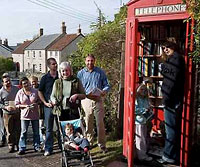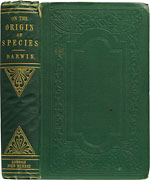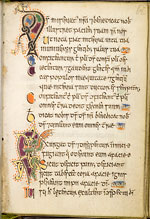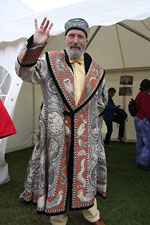Bookish Bits from Britain
A library in a telephone box and a first edition in the loo! By Stephen Maughan Stephen Maughan is a freelance journalist and book collector based in Sussex, England. He loves his local library, which has changed little since the Edwardian age. He also writes with a typewriter. Curiously, he also enjoys modern technology, book superstores, and drinking cappuccino.
In my last round up of the stimulating world of British books, I mentioned briefly a story concerning the closure of a small Borders, which met with wild protests in the streets of the sleepy town of Swindon. Little did I know, this first closure rapidly spun out of control, and by January 1, Borders had closed every one of its 45 UK stores. Where once the arrival of the American giant in 1997 led many to call Borders the silver line in the looming gray clouds of declining book sales, it seemed it wasn’t quite to be. Newspapers and observers muttered bad management, and an over confidence of competing against the Internet and grocery stores. Still, if nothing else, it gave a chance to find last minute Christmas ideas in a huge “everything must go” sale of the decade. Frantic shoppers stampeded over the assortment of stationary, DVDs, magazines, toys, and even a few books. This now leaves the Waterstone’s chain as the sole presence on the British high street, with close to 300 stores. Although some ponder the future of bookstores, many an independent bookshop owner could be heard popping open the champagne, celebrating that they no longer have to compete against Borders notorious 2-for-1 deals.
At one point you could rely on your local library to be a quiet and dignified haven of the finest literature, but increasingly even the quaint little library has come under attack. The ripples of the global recession are having dramatic effects, with many local councils choosing to close popular local libraries in order to save a few bucks. Minister of State for Culture and Tourism Margaret Hodge put forward a few sound bites about libraries needing to be “modern and relevant,” warning that they will turn into “a curiosity of history such as telex machines or typewriters.” Hodge has numerous ideas for libraries to bring in the pounds, such as “selling” its books online, creating so-called i-book hubs, building trendy cappuccino bars, and generally embracing the zeitgeist.
With all this talk of libraries being forced to modernize, the residents of Westbury village in Somerset have taken a step backwards, directly into the iconic British red telephone box, by transforming it into a Lilliputian library that stocks 100 books for its population of 800.
When the local council decided the weekly mobile library van was not cost efficient, and would no longer visit, the upset residents were determined to take the matter into their own hands. An empty phone box proved to be the unlikely solution. Janet Fisher, who lives opposite the disused phone box, came up with the idea. At a village tea party in August 2009 she suggested the phone box library, which was accepted at once. Local residents bought the box from BT for £1 and donated their books. The new library was an instant hit, with users able to browse the shelves 24 hours a day, 365 days a year, something no other library can offer. The 100 volumes are to be kept at a constant level, with new stock arriving from donations and any unpopular books being shipped to local charity stores.
Bob Dolby, the local parish councillor is particularly pleased, claiming, “It really has taken off and is a community service in constant use.” The local residents are also proud of their new library, which comes complete with a silence sign inside and is well-lighted at night. Frequent visitor Angela Buchanan agreed with Dolby, telling reporters, “It’s great you can use this. All sorts of interesting books turn up, and good literary novels.”
Charles Darwin’s groundbreaking On the Origin of Species was first published in 1859, with just 1,250 copies printed. One of those in the original publisher’s blind-stamped green cloth—which had been sitting in a restroom for decades— was sold at Christie’s London for £103,250 ($170,569) last November. Visitors to the anonymous family in Oxfordshire will no doubt be surprised to learn the book they were flipping through while they were, err, relieving themselves in the guest lavatory was actually a first edition! The family bought the book in 1969 for “a few shillings.”
If you are planning a trip to Scotland this spring, a trip to the library at the University of Edinburgh is a must, as it currently has Scotland’s oldest book, The Celtic Psalter, on display. The book dates from the eleventh century, and is available for public viewing for the first time in its thousand-year history. The medieval manuscript contains handwritten psalms of King David in Latin, with Celtic and Pictish illustrations. The University’s librarian Joseph Marshall calls The Celtic Psalter “as beautiful today as it was when it was first written.” Also on display is a fine copy of Romeo and Juliet published during Shakespeare’s lifetime and the first major Scottish printed book, Aberdeen Breviary, written in 1509. The exhibition runs until March 14, 2010.
Britain can be a land of contradictions. For we are told to modernise our libraries with the latest gadgets, yet at the same time encouraged to preserve and honor the ancient oral storytelling tradition of our heritage. Taffy Thomas has just been made Britain’s first Laureate for Storytelling. Thomas, 60, has already been awarded an MBE (Member of the Order of the British Empire) by the Queen for his services to storytelling and charity. He took up the two-year laureate appointment at a lavish ceremony held in the British Library on January 30. He plans to travel the length and breadth of the UK to entertain listeners with his storytelling skills—he has a repertoire of 300 stories, some of which have just been collected and published as Taffy’s Coat Tales. Aside from being entertained, he hopes others will be inspired in all manners of life, telling journalists, “If someone can tell a story they can also speak at a job interview, or even in a court of law. The art of storytelling empowers a person.”












